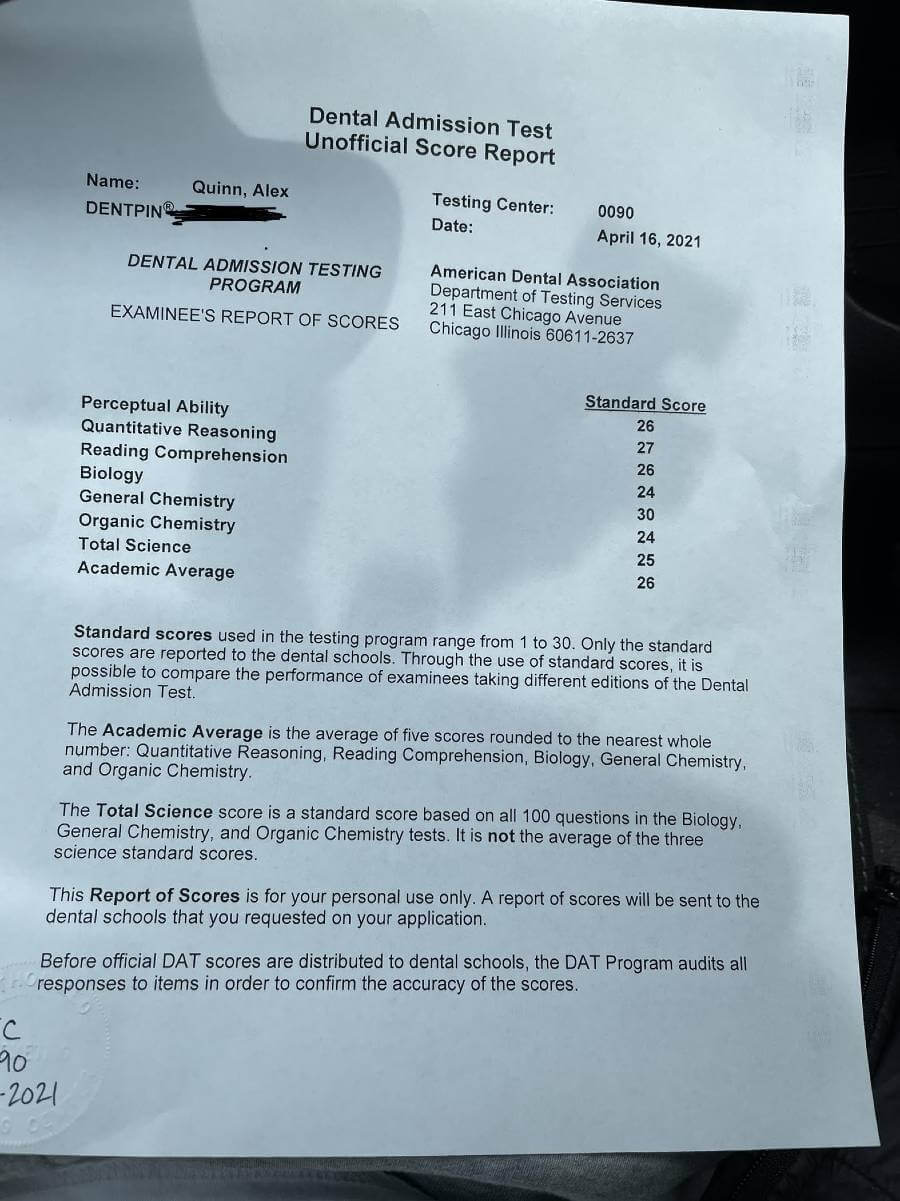Featured Student of August

Meet Alex, a happy DAT Bootcamp customer who recently conquered the DAT. I’ve asked Alex to share his DAT experience with us as the Featured Student of August.
As a student working full-time, what were some challenges you faced preparing for the DAT, and how did you overcome them?
The main challenge faced when you’re working full time and taking college courses is obviously time. I think it’s important to know what you’re capable of as far as time management. I think we all have more time than we like to admit sometimes-we like to think we are busier than we actually are. If you schedule things out to the minute and do so far in advance, it is surprising how much time there really is. Part of that is knowing what you’re capable of as far as studying too. I think most people are within 4-5 hours of studying per day that is productive, I’m sure most pre-dental students are more than that, I at least think I am. I had about 6 or 7 hours of effective studying in me each day, then I’d do homework for school in the evenings because it was more just tedious work and didn’t require as much focus to be effective, whereas DAT studying requires a lot of attention and memorization. I’d start studying for the DAT at 7 at the library, and I’d schedule work depending on the day, then I’d take a 30 minute break around 1 or 2, then study until 8, then go home and work on regular school-work. It was hard not having much of a life for a couple months, but it pays off. Different jobs have different levels of requirements of time and commitment, I work as a sales manager full time and it took a lot of time outside of work helping the people I work with, so I let people know that I might not be as available during the 2 weeks leading up to my test.
I also made sure I had time where I wasn’t studying and wasn’t thinking about studying. I never studied, worked, or did homework on Sundays. I wouldn’t even think about it if I could. It can be overwhelming to do so much and take in so much, so having that one day of the week gave me a great kick start coming in to Monday. I think the same thing can be applied daily when it comes to taking breaks. I also made sure the first thing I did in the morning was not DAT-focused either. I realize that not everyone is religious, so taking time to meditate or just think about one’s goals/motivations/self in general would be very effective, where as I took this time each day to read scriptures and pray–it doesn’t have to be much time, I usually only took 15-20 minutes.
What advice would you have to other students working full-time while studying for the DAT?
My advice would be the same advice that you see from Ari at the end of every practice exam, “don’t focus too much on the score, instead continue to focus on areas of improvement”. I think this is great advice. I’ve always been very confident in my ability with organic chemistry, but I couldn’t even finish reading a passage in under 20 minutes when I first started reading comprehension, and I think everyone struggles with PAT. I also was missing a few required biology courses prior to the exam, so reading, PAT, and biology were the three categories I spent the most of my time on. I still focused on math, gen chem, and organic chem as needed, but I realized that these wouldn’t be as worth my time.
The most effective improvements I saw in my own performance was the last week and a half. Going into it, I mapped out exactly when I would take the practice exams, and when I would study different topics. I first memorized DAT Bootcamp bio notes, gen chem equation sheet, lab techniques, and o chem reactions. Then, for the next week and a half, I would start my day by taking either a full length practice test, or half a test, then spend the second half of the day studying areas I needed to improve in. The MOST effective thing I did to improve my understanding was carefully analyzing and understanding every question from the practice tests, and why you got it right or why you got it wrong. If I had started this process earlier and given myself a full 2 or 3 weeks to do this, I think my score would be better than it was. I would also simulate the real practice environment as much as possible, by taking it at the exact time, in a different setting from home, and with the same amount of breaks/materials.
What is something you would have changed to help your study schedule go more smoothly?
I would have started memorizing things much earlier. I overestimated my ability to memorize information in a short amount of time, so it came down to 2 days before the exam and I was still working on memorizing bio, o chem, and gen chem material when I should have been focusing on practice tests and reviewing answers. If I had taken the time to memorize all of that information before ever beginning the practice tests my studies would have been a lot more effective.
I also think it’s important to continue to study and focus on areas of confidence. I was very confident in organic chemistry, more so than any other topic, and because of that I wouldn’t pay as much attention when I got answers wrong, or focus on areas where my knowledge was lacking. For this reason, organic chemistry was the only section of the DAT where I scored lower on my actual DAT than I did on my practice exams. I can say from experience that there’s almost nothing worse than the feeling that your score would be 1 or 2 points higher if you just knew the answer to that one question-something you should know. This was the feeling I had about the organic chemistry, so avoid procrastinating areas of strength.
Alex’s Score Breakdown
- Biology24
- General Chemistry30
- Organic Chemistry24
- Reading Comprehension26
- Perceptual Ability26
- Quantitative Reasoning27
- Total Science25
- Academic Average26


